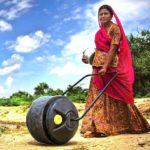“When Cynthia Koenig, a young social entrepreneur from New York, learned that millions of girls and women around the world spend hours each day collecting water from distant sources, she decided to create a new way to help people in poor communities transport water and it’s called the WaterWheel. Koenig’s WaterWheel allows people to roll water in a 50-liter container versus carrying it in 5 gallon (19 liter) jugs. Koenig estimates that the WaterWheel can save women 35 hours per week in water transport time, as well as prevent the physical strain that comes from balancing 40 pounds of water on top of their heads for hours each day.
Every day around the world, over 200 million hours are spent each day fetching water, often from water sources miles from home, and this task usually falls to women and girls. By freeing up valuable time, the WaterWheel allows women to spend time on income-generating activities that can help pull her family out of poverty. The time savings also means that there is a greater likelihood that girls will be allowed to stay in school, further reducing the rate of intergenerational poverty.
After receiving a $100,000 Grand Challenges Canada prize to develop the WaterWheel, Koenig founded a social enterprise company, Wello. The company is in an early stage of development and has been piloting the WaterWheel in rural communities in India. Koenig also plans on continuing to make the WaterWheel itself more useful by adding in filtration, drip irrigation kits, even a cell phone charger that uses the rotation of the wheel to charge the battery of the cell phone and give people more access to essentials like communication and education.
To learn more about this invention and its potential to transform the lives of many girls and women around the world, check out Koenig’s TED talk and you can read a recent article in The Guardian about her venture. To learn more about how to support her work, visit Wello’s website.”
For a wonderful book about more female innovators and inventors throughout history, check out “Girls Think of Everything: Stories of Ingenious Inventions by Women” for readers 8 to 13.
To help children and teens better understand the challenges many children around the world face in order to go to school, check out the blog post, “Honoring Malala: Mighty Girl Books on Children’s Fight for Education,” showcasing our top books for young readers on children’s educational access issues.
A Mighty Girl also has a section highlighting stories that feature poverty and hardship as a significant theme. Such stories provide opportunities for parents to discuss these topics with their children while also helping to foster children’s empathy for people living in difficult circumstances. Learn more here.”

Just another WordPress site
